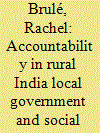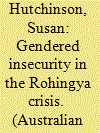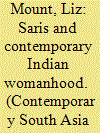| Srl | Item |
| 1 |
ID:
142599


|
|
|
|
|
| Summary/Abstract |
This article studies variation in individuals’ perceived ability across India to hold local officials accountable for their performance. It finds significant gender differences in accountability perceptions, consistent with traditional social institutions. Exposure to progressive institutions of education and labor mobility is associated with the elimination and reversal of gender differences.
|
|
|
|
|
|
|
|
|
|
|
|
|
|
|
|
| 2 |
ID:
160368


|
|
|
|
|
| Summary/Abstract |
The purpose of this piece is to analyse the data on pregnant women and new mothers in the Rohingya refugee population in Bangladesh to determine if it can be used as an indicator of increased conflict related sexual violence and ethnic cleansing. The reported data is problematised in the context of the notorious unreliability of data in emergencies. By comparing the available data with known birth rates among the Rohingya and the broad demographic patterns seen in the aftermath of the Rwandan genocide the piece shows there is cause for the concerns of increasing conflict related sexual violence and ethnic cleansing. When taken with qualitative data from international organisations responding to the humanitarian crisis and refugee testimony, the paper reliably concludes the quantitative data can tell a reliable story of conflict related sexual violence and ethnic cleansing in Rakhine State. The paper also highlights the need for improved sex- and age-disaggregated data collection in emergencies.
|
|
|
|
|
|
|
|
|
|
|
|
|
|
|
|
| 3 |
ID:
155746


|
|
|
|
|
| Summary/Abstract |
Despite the major changes in urban middle-class Indian women’s clothing in the past 30 years, there are few accounts of women’s perspectives on their changing dress. This paper analyzes 31 semi-structured interviews with urban middle-class women in Delhi, Mumbai, and Pune to examine the changing meanings associated with saris in contemporary India. While the sari has entered the realm of global fashion and can thus be characterized as modern and sexy, the garment remains strongly associated with respect and maturity for women, particularly within their families, but also in public spaces and in the workplace. Women link their practices of sari wearing to modern aspirations by emphasizing saris as ‘modern’ fashionable attire, while simultaneously reinforcing the sari as a symbol of traditional, respectable married womanhood, thus exploiting the traditional meanings that the sari confers on them to their advantage. The emphasis on saris as simultaneously ‘modern’ and representative of Indian tradition indicates the cultural pressure placed on middle-class women to conform to dictates of traditional womanhood while also aligning themselves with modernity.
|
|
|
|
|
|
|
|
|
|
|
|
|
|
|
|